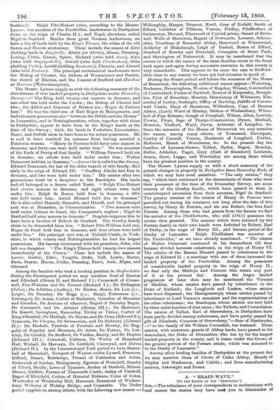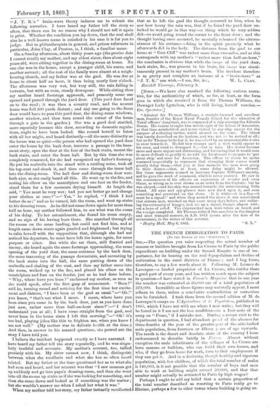A "BRAIN-WAVE."
[To THE EDITOR OF TUB " SPECTATOR:I
S111,—The reluctance of your correspondents to authenticate with real names the stories they have sent you in illustration ef
"j. T. K.'s " brain-wave theory induces me to submit the following narrative. I have heard my father tell the story so often, that there can be no reason why I should not tell it again in print. Whether the condition you lay down, that the real shall also be a well-known name is satisfied in his case it is for you to judge. But to philanthropists in general, and prison reformers in particular, John Clay, of Preston, is, I think, a familiar name. On a Sunday afternoon, about thirty years ago (the precise date I cannot recall) my mother, and my eldest sister, then about eight years old, were sitting together in the dining-room at home. No one else was in the house, except a younger child, his nurse, and another servant ; all the rest of the family were absent at a neighbouring church, and my father was at the gaol. He was due at home in about half an hour, it then being nearly four o'clock. The afternoon was very wet, but very still, the rain falling in torrents, but with an even, steady downpour. While sitting thus my mother heard footsteps approach, and presently some one opened and passed through the yard door. (This yard door faced on to the road ; it was then a country road, and the nearest house was full 500 yards distant ; and any one going to the front door would have to pass this yard door, the dining-room windows, another window, and then turn round the corner of the house through a gate in the garden.) She was a good deal startled, more especially because this door, according to domestic regula tions, ought to have been locked. She roused herself to listen with all her might, and heard distinctly—all the more distinctly as the house was so quiet—the person who had opened the yard door enter the house by the back door, traverse a passage in the basement story, open the door at the foot of the back stairs, mount the back stairs, and enter the front hall. But by this time she was completely reassured, for she had recognized my father's footstep. He put his umbrella into the stand with a rattling noise, took off his top-coat and shook it, and then came through the inner hall into the dining-room. The hall door and dining-room door were both ajar, so she easily beard all this. He went up to the fire, and resting his elbow on the mantelpiece and one foot on the fender, stood there for a few moments drying himself. At length she said, "You must be very wet; had you not better go and change your clothes at once?"—" Yes," he replied, "I think I had better do so ;" and so he turned, left the room, and went up stairs to his dressing room. As he did not come down again for more than half an hour, my mother followed him, to see what was the cause of his delay. To her astonishment, she found his room empty, and no sign of his having been there. She searched through all the rooms on the same landing, but could not find him, and at length came down stairs again puzzled and frightened ; but trying to calm herself with the supposition that, although she had not
noticed his departure, he must have left the house again, for some purpose or other. But while she sat there, still flurried and uneasy, she heard again the same footsteps approaching, the same opening of the yard door, the same entrance by the back door, the same traversing of the passage downstairs, and mounting by the back stairs into the hall, the same putting down of the umbrella and shaking of the coat, and then my father came into the room, walked up to the fire, and placed his elbow on the mantelpiece and foot on the fender, just as he had done before. "Why, where have you been ?" exclaimed my mother, as soon as he could speak, after the first gasp of amazement. " Been?" said he, turning round and noticing for the first time her excitement and distress, "I have been at the gaol as usual."—" Oh !" you know, "that's not what I mean. I mean, where have you been since you came in by the back door, just as you have done just now, rather more than half-an-hour since?"—" I don't understand you at all ; I have come straight from the gaol, and never been in the house since I left this morning."—" Oh! it's too bad, playing jokes like this to frighten me, when you know I am not well." (My mother was in delicate health at the time.) And then, in answer to his amazed questions, she poured out the Story I have told you.
I believe the incident happened exactly as I have narrated. I have heard my father tell the story repeatedly, and he was singularly truthful and accurate. My mother's account, too, tallied precisely with his. My sister cannot now, I think, distinguish between what she recollects and what she has so often heard related. But my father at the time questioned her as to what she had seen and heard, and her account was that "I saw mamma get up suddenly and go into papa's dressing-room, and then she went into all the rooms up stairs as if she was looking for something, and then she came down and looked as if something was the matter ; but she wouldn't answer me when I asked her what it was."
When my mother told her story, my father instantly recollected
that as he left the gaol the thought occurred to him, when he saw how heavy the rain was, that if he found the yard door unlocked he would go in that way—a thing which he very seldom did—to avoid going round the corner to the front door ; and the thought having once occurred, he mentally rehearsed the circumstances of his entrance—doing in the spirit precisely what he afterwards did in the body. The distance from the gaol to our home at "East Cliff" was rather more than two miles, and as this corresponds with my mother's "rather more than half-an-hour," the conclusion is obvious that while the imago of the yard door, back stairs, &c., was present in his brain, his imago was siinultaneously present in my mother's brain. The incident therefore is as pretty and complete an instance of a " brain-wave " as "J. T. K." can wish.-1 am, Sir, &e., W. L. CLay. Rainhill Vicarage, February 9.
[NoTE.—We have also received the following curious narrative, for the authenticity of which, so far, at least, as the form goes in which she received it from Sir Thomas Williams, the Dowager Lady Lyttelton, who is still living, herself vouches. ED. Spectatm..] "Admiral Sir Thomas Williams, a straight-forward and excellent man, founder of the Royal Naval Female School for the education of Naval officers' daughters, was in command of a ship crossing the Atlantic Ocean. His course brought him within sight of the Island of Ascension, at that time uninhabited. and never visited by any ship except for the purpose of collecting turtles, which abound on the coast. The island was barely described on the horizon, and was not ta bo noticed at all ; but as Sir Thomas looked at it, he was seized by an unaccountable desire to steer towards it. He felt how strange such a wish would appear to his crew, and tried to disregard it ;—but in vain. his desire became more and more urgent and distressing, and foreseeing that it would soon be more difficult to gratify it, he told his Lieutenant to prepare to 'put about ship,' and steer for Ascension. 'rho officer to whom he spoke ventured respectfully to represent that changing their course would greatly delay them,—that jest at that moment the men were going to their dinner,—that, at least, some delay might be allowed. But these arguments seemed to increase Captain Williams's anxiety, and he gave the word of command, which is never resisted. He saw in the countenances of his officers an expression of wonder and oven blame, as strong as is ever shown on an order from the Captain ; but ho was oboyed,—and the ship was steered towards the uninteresting little island. All eyes and spy-glasses wore now fixed upon it, and soon something was perceived on the shore. • It is white—it is a flag—it must be a signal! ' and when they neared the shore, it was ascertained that sixteen men, wrecked on that coast many days before, and suffering the extremity of hunger, had set up a signal, though almost without a hope of relief. The shipwrecked mon wore taken on board, and the voyage completed. Sir Thomas related this anecdote in the simplest and most tranquil manner, in A.D. 1813 (years after the date of its occurrence), to the writer of this account.
"Hagley Hag May 6, 1865. "S. L."































 Previous page
Previous page